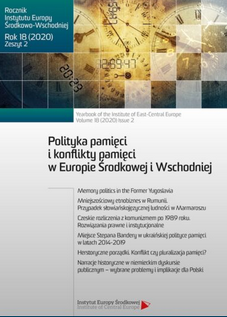Selected aspects of historical policy towards the Slovak National Uprising in the Slovak Republic
Selected aspects of historical policy towards the Slovak National Uprising in the Slovak Republic
Author(s): Krzysztof ŻarnaSubject(s): Political history, Government/Political systems, Nationalism Studies, WW II and following years (1940 - 1949), Transformation Period (1990 - 2010), Politics of History/Memory
Published by: Instytut Europy Środkowej
Keywords: nationalism; Marian Kotleba; Slovak National Uprising; Slovak Republic;
Summary/Abstract: The Slovak Republic is a state that was formed as a result of the disintegration of the Czech and Slovak Federative Republic in 1993. Slovaks do not have rich traditions of their own statehood. For nearly a thousand years, the Slovak lands were within the sphere of influence of Hungary and they formed a common state with the Czechs, although the latter had a dominant position. The only period of owning one’s own statehood was during 1939-1945, i.e. the functioning of the Slovak State / Slovak Republic. However, it was a country under the influence of the Third Reich. The article concerns selected aspects of the historical policy towards the Second World War appearing in the political discourse in the Slovak Republic. Issues that evoke extreme emotions have been analyzed: the Slovak National Uprising and the Slovak State / Slovak Republic. The activities of the People’s Party – Our Slovakia, which was the only one that refers to the tradition of the Slovak state in 1939-1945 and attacks the Slovak National Uprising were also analyzed. Transcripts were analyzed from meetings of the Slovak National Council, press articles and programs of individual political parties as well as statements of politicians with particular emphasis on the People’s Party – Our Slovakia. The article uses a comparative method and a case study.
Journal: Rocznik Instytutu Europy Środkowo-Wschodniej
- Issue Year: 18/2020
- Issue No: 2
- Page Range: 165-186
- Page Count: 22
- Language: English

